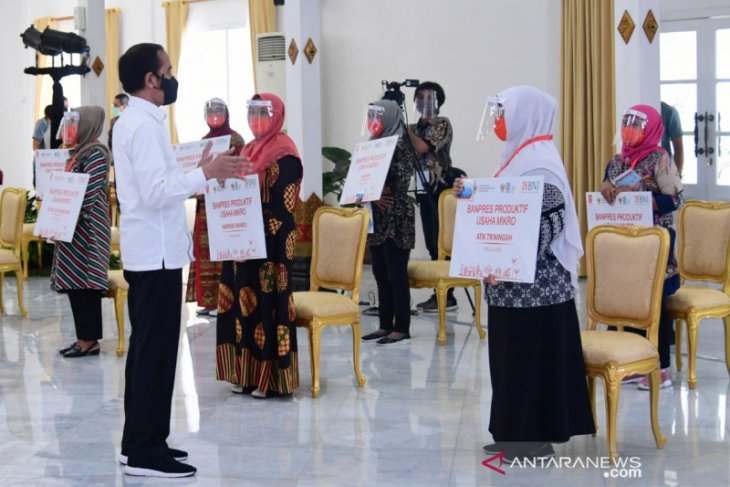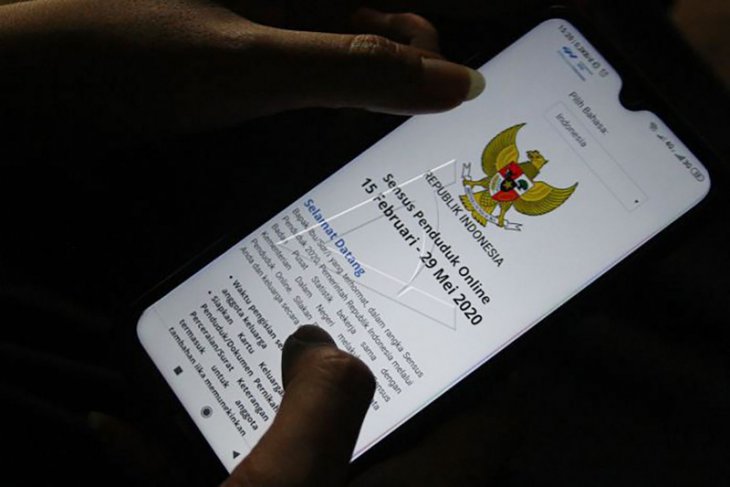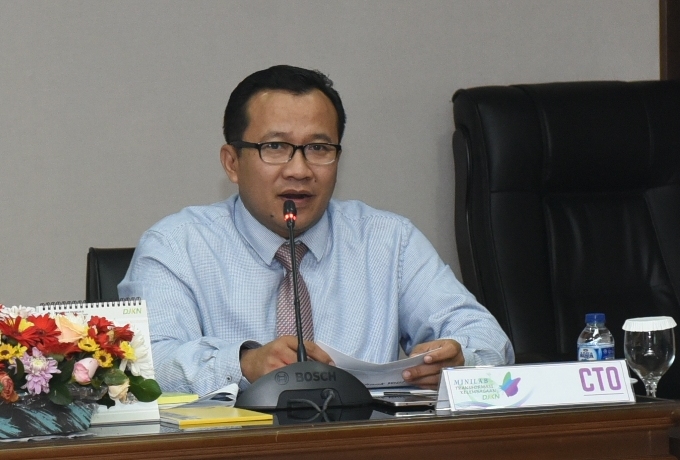Live Streaming
Program Highlight
Company Profile
Indonesia Records 2,743 Fresh COVID-19 Cases, 1,774 Recoveries
Written by Ani HasanahThe Indonesian Task Force for COVID-19 Response, Monday, reported 2,743 fresh cases in the country over the last 24 hours, bringing the tally to 174,796, and 1,774 recoveries, thereby totaling 125,959 people recovering from COVID-19.
Furthermore, 74 people died of COVID-19, bringing the death toll to 7,417 since the Indonesian government announced its first confirmed COVID-19 cases on March 2, 2020.
A total of 15,305 samples were subject to examination, bringing the total number of specimens examined in the country, so far, to 2,239,642.
Jakarta remained the city with the largest recorded rise in the number of fresh cases, reaching 1,049, followed by 323 cases in East Java, 179 cases in Central Java, 145 cases in West Java, and 129 cases in Bali.
Meanwhile, East Java Province recorded the highest death toll within a day, notably 21 people succumbing to the disease, followed by 14 deaths in Jakarta.
The largest number of recoveries on Monday was recorded in Jakarta, reaching 404, followed by 383 people recovering from the disease in East Java.
The capital city recorded 40,086 confirmed cases, so far, followed by 33,543 cases in East Java, 13,964 cases in Central Java, 11,978 cases in South Sulawesi, and 11,063 cases in West Java.
The total number of recoveries in Jakarta has reached 30,538, while 26,139 in East Java, 9,247 in South Sulawesi, 8,973 in Central Java, and 6,150 in West Java. (ANTARA)
September
Finance Ministry Outlines Three Strategies for Avoiding Recession
Written by Ani Hasanah
President Joko Widodo (Jokowi) interacts with recipients of productive presidential aid for micro-enterprises in Yogyakarta on August 28, 2020. (ANTARA/HO-BNI/sh)
The Finance Ministry is focusing on three strategies to keep Indonesia from plunging into a recession.
The three strategies are accelerating the National Economic Recovery (PEN) Program, and strengthening government consumption as well as public consumption, head of the Financial Policy Center of the ministry’s Fiscal Policy Agency (BKF), Adi Budiarso, said in a meeting with Commission VI of the House of Representatives, which oversees industry and investment, in Jakarta on Monday.
"Optimizing state expenditure has become important to stimulate the economy," Budiarso remarked.
Efforts are being made to expedite the implementation of the PEN program by improving budget absorption, especially for the program, which has been included in the budget execution list (DIPA), he elaborated.
As of August 26, 2020, budget absorption for the national economic recovery program has reached Rp192.53 trillion, or 27.7 percent of the allocated budget of Rp695.2 trillion.
To increase state consumption and thereby encourage economic growth, the government has accelerated the disbursement of the 13th-month salary to civil servants, Budiarso said.
Good expenditure, he said, is targeted to support the implementation of the new work-from-home (WFH) system and the digitalization of bureaucracy.
Capital expenditure would be reallocated to support the development of infrastructure for public service digitalization and the relaxation of the policy on good and services procurement.
To improve public consumption, he said, the government has accelerated expenditure on social aid, among other steps, by increasing the amount of aid, its frequency, and then extend the period of disbursement.
Currently, the government has disbursed Rp2.4 million per person in productive aid to 12 million micro, small, and medium enterprise owners.
The government has also provided aid to formal workers earning a salary of less than Rp5 million per month, along with a microloan (KUR) rate subsidy. (ANTARA)
September
54.1 million Indonesians Take Part in Online Population Census
Written by Ani Hasanah
An illustration of the online 2020 Population Census of Indonesia, which covered 19 percent of the country's total population.
According to the records of the Central Statistics Agency (BPS), 54.1 million Indonesians registered for the population census, which was conducted online from 15 February 2020 to 29 May 2020.
"This number is very large because it is equivalent to almost twice as much as Australia's population. It is a very encouraging achievement, bearing in mind that this is the first population census conducted online in Indonesia,” said the head of BPS, Suhariyanto, as the September 2020 Population Census kicked off online in Jakarta on Monday.
Suhariyanto also lauded all parties and communities who contributed to the success of the online population census.
The census, however, is not yet complete because the 51.4 million Indonesians who took part in the online census account for 19 percent of the country's total population. Around 81 percent of Indonesians remain to be covered by the census.
Thus, starting September 1, 2020, population census officers will go to the field to do a census count to record population data that is yet to be recorded.
Suhariyanto explained that population data is important for planning in various sectors ranging from food, housing, education, health to transportation.
"There can be no precise policy without accurate data. To obtain complete population data, BPS together with 54 other countries will conduct a population census in 2020, " he added.
The first objective of conducting a population census is to provide de facto and de jure data on the number, composition, distribution, and characteristics of the Indonesian population.
The second objective is to provide demographic parameters as well as other population characteristics for population projection purposes.
“Thus, the data from the 2020 population census is not only important for current planning, but also for anticipating what will happen to Indonesia in the future," Suhariyanto noted.
The population census officers, who will go door-to-door to collect data on the country's citizens, will implement strict health protocols such as wearing face masks, maintaining physical distancing, and washing hands, amid the COVID-19 pandemic. (ANTARA)
September
Budget Realization for Economic Recovery Reaches Rp192 Trillion
Written by Ani HasanahAdi Budiarso (kemenkeu.go.id)
The Finance Ministry has reported that the realization of the budget for national economic recovery has reached Rp192.53 trillion as of August 26, 2020, accounting for 27.7 percent of the budget ceiling of Rp695.2 trillion.
“The figure is quite encouraging,” chief of the Financial Sector Policy Center of the Fiscal Policy Board at the Finance Ministry, Adi Budiarso, said at a hearing with Commission VI of the House of Representatives (DPR) in Jakarta on Monday.
The realization of budget funds for the health sector has reached Rp12.3 trillion of the Rp87.55-trillion ceiling; social protection Rp101.06 trillion of the Rp203.9-trillion ceiling; business incentives Rp17.23 trillion of the Rp120.61-trillion ceiling; and, micro, small, and medium businesses Rp47.03 trillion of the Rp123.46-trillion ceiling.
The realization of the budget for the sectoral post of ministries, non-ministerial government institutions, and regional governments have touched Rp14.91 trillion of the Rp106.11-trillion ceiling, while the budget for corporate financing with a ceiling of Rp53.57 trillion has not been realized.
The realization of the budget for national economic recovery since the first half of 2020 has reached 24.4 percent of the total allocation.
To speed up national economic recovery, the government has extended several programs until December 2020, expedited the processing of new proposals from various clusters, redesigned programs to make them more effective, and shortened the bureaucratic process.
Finance Minister Sri Mulyani Indrawati has stressed that national economic recovery would largely depend on the availability of the coronavirus vaccine.
Once a vaccine is found, the government will distribute it to the public and expedite the treatment of COVID-19 patients, she said at an online discussion in Jakarta last Thursday.
"Whether the vaccine will soon be discovered and can be distributed will have an extraordinary impact on all activities of the community, including economic activities," she opined.
She said the government has drafted various policies to mitigate the impact of COVID-19 through the National Economic Recovery (PEN) program. (ANTARA)




